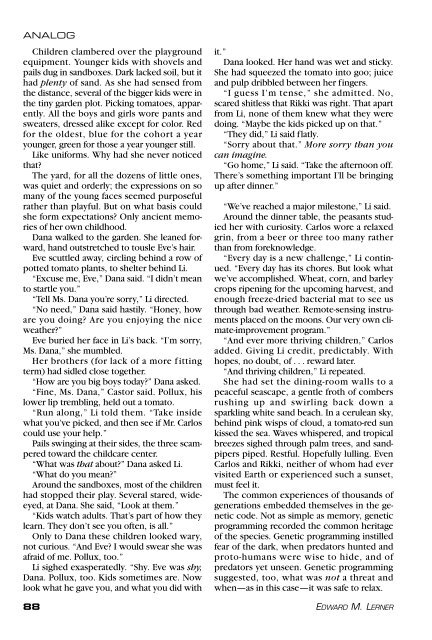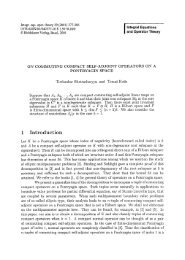Analog Science Fiction and Fact - June 2013
Analog Science Fiction and Fact - June 2013
Analog Science Fiction and Fact - June 2013
Create successful ePaper yourself
Turn your PDF publications into a flip-book with our unique Google optimized e-Paper software.
ANALOG<br />
Children clambered over the playground<br />
equipment. Younger kids with shovels <strong>and</strong><br />
pails dug in s<strong>and</strong>boxes. Dark lacked soil, but it<br />
had plenty of s<strong>and</strong>. As she had sensed from<br />
the distance, several of the bigger kids were in<br />
the tiny garden plot. Picking tomatoes, apparently.<br />
All the boys <strong>and</strong> girls wore pants <strong>and</strong><br />
sweaters, dressed alike except for color. Red<br />
for the oldest, blue for the cohort a year<br />
younger, green for those a year younger still.<br />
Like uniforms. Why had she never noticed<br />
that?<br />
The yard, for all the dozens of little ones,<br />
was quiet <strong>and</strong> orderly; the expressions on so<br />
many of the young faces seemed purposeful<br />
rather than playful. But on what basis could<br />
she form expectations? Only ancient memories<br />
of her own childhood.<br />
Dana walked to the garden. She leaned forward,<br />
h<strong>and</strong> outstretched to tousle Eve’s hair.<br />
Eve scuttled away, circling behind a row of<br />
potted tomato plants, to shelter behind Li.<br />
“Excuse me, Eve,” Dana said. “I didn’t mean<br />
to startle you.”<br />
“Tell Ms. Dana you’re sorry,” Li directed.<br />
“No need,” Dana said hastily. “Honey, how<br />
are you doing? Are you enjoying the nice<br />
weather?”<br />
Eve buried her face in Li’s back. “I’m sorry,<br />
Ms. Dana,” she mumbled.<br />
Her brothers (for lack of a more fitting<br />
term) had sidled close together.<br />
“How are you big boys today?” Dana asked.<br />
“Fine, Ms. Dana,” Castor said. Pollux, his<br />
lower lip trembling, held out a tomato.<br />
“Run along,” Li told them. “Take inside<br />
what you’ve picked, <strong>and</strong> then see if Mr. Carlos<br />
could use your help.”<br />
Pails swinging at their sides, the three scampered<br />
toward the childcare center.<br />
“What was that about?” Dana asked Li.<br />
“What do you mean?”<br />
Around the s<strong>and</strong>boxes, most of the children<br />
had stopped their play. Several stared, wideeyed,<br />
at Dana. She said, “Look at them.”<br />
“Kids watch adults. That’s part of how they<br />
learn. They don’t see you often, is all.”<br />
Only to Dana these children looked wary,<br />
not curious. “And Eve? I would swear she was<br />
afraid of me. Pollux, too.”<br />
Li sighed exasperatedly. “Shy. Eve was shy,<br />
Dana. Pollux, too. Kids sometimes are. Now<br />
look what he gave you, <strong>and</strong> what you did with<br />
it.”<br />
Dana looked. Her h<strong>and</strong> was wet <strong>and</strong> sticky.<br />
She had squeezed the tomato into goo; juice<br />
<strong>and</strong> pulp dribbled between her fingers.<br />
“I guess I’m tense,” she admitted. No,<br />
scared shitless that Rikki was right. That apart<br />
from Li, none of them knew what they were<br />
doing. “Maybe the kids picked up on that.”<br />
“They did,” Li said flatly.<br />
“Sorry about that.” More sorry than you<br />
can imagine.<br />
“Go home,” Li said. “Take the afternoon off.<br />
There’s something important I’ll be bringing<br />
up after dinner.”<br />
“We’ve reached a major milestone,” Li said.<br />
Around the dinner table, the peasants studied<br />
her with curiosity. Carlos wore a relaxed<br />
grin, from a beer or three too many rather<br />
than from foreknowledge.<br />
“Every day is a new challenge,” Li continued.<br />
“Every day has its chores. But look what<br />
we’ve accomplished. Wheat, corn, <strong>and</strong> barley<br />
crops ripening for the upcoming harvest, <strong>and</strong><br />
enough freeze-dried bacterial mat to see us<br />
through bad weather. Remote-sensing instruments<br />
placed on the moons. Our very own climate-improvement<br />
program.”<br />
“And ever more thriving children,” Carlos<br />
added. Giving Li credit, predictably. With<br />
hopes, no doubt, of . . . reward later.<br />
“And thriving children,” Li repeated.<br />
She had set the dining-room walls to a<br />
peaceful seascape, a gentle froth of combers<br />
rushing up <strong>and</strong> swirling back down a<br />
sparkling white s<strong>and</strong> beach. In a cerulean sky,<br />
behind pink wisps of cloud, a tomato-red sun<br />
kissed the sea. Waves whispered, <strong>and</strong> tropical<br />
breezes sighed through palm trees, <strong>and</strong> s<strong>and</strong>pipers<br />
piped. Restful. Hopefully lulling. Even<br />
Carlos <strong>and</strong> Rikki, neither of whom had ever<br />
visited Earth or experienced such a sunset,<br />
must feel it.<br />
The common experiences of thous<strong>and</strong>s of<br />
generations embedded themselves in the genetic<br />
code. Not as simple as memory, genetic<br />
programming recorded the common heritage<br />
of the species. Genetic programming instilled<br />
fear of the dark, when predators hunted <strong>and</strong><br />
proto-humans were wise to hide, <strong>and</strong> of<br />
predators yet unseen. Genetic programming<br />
suggested, too, what was not a threat <strong>and</strong><br />
when—as in this case—it was safe to relax.<br />
88 EDWARD M. LERNER

















